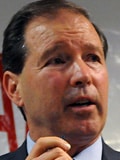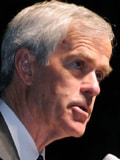
Tom Udall
Two health-insurance reform measures continue to move forward in the nation’s capitol this week without a public option, but both U.S. senators from New Mexico are pledging to keep the public option alive.
Reform still faces an arduous trek through Capitol Hill and to the president.
“I’m going to at every stage try to make sure that a public option is included. It’s a serious fight. It’s hard to predict. I’d say right now it’s about 50-50,” Sen. Tom Udall, D-N.M., said.
“I believe this is the best way to keep insurance honest, bring down costs. It will also get more uninsured small business employees and families insured,” Udall said of a public option.

Jeff Bingaman
U.S. Sen. Jeff Bingaman, D-N.M. and a member of the Senate Finance Committee and “gang of six” senators developing the America’s Healthy Future Act, and was on the winning side of a 14-9 vote on Tuesday.
The measure can now be merged with a bill approved earlier this year by the Senate Health, Education, Labor and Pensions Committee and debated on the Senate floor. As the only Democrat who serves on both committees, Bingaman was in a unique position to influence both pieces of legislation.
“We have been talking about health insurance reform for decades. With this vote, we’re finally on a path to enacting it,” Bingaman said following Tuesday’s vote. “This bill reduces the growth in health-care costs, which is important to all American families but particularly important to New Mexican families, who are expected to experience the highest growth in premiums in the nation if reform is not enacted.”
The act would prevent insurance companies from denying health insurance to Americans because of pre-existing conditions.
“It also prevents insurance companies from capping coverage at an annual or lifetime level,” Bingaman said. “And, if Americans like the coverage they have, they can keep it.”
Bingaman is a strong supporter of the so-called public option — a proposed health-care plan that would be available to all Americans through newly formed health-insurance “exchanges” that focuses exclusively on providing care, not turning a profit. The Finance Committee bill does not contain a public option, but Bingaman said he is hopeful that the final bill sent to the president will.
Udall emerges as a public option leader
A week ago, Udall, along with 29 other senators, sent a letter to Senate Majority Leader Harry Reid, D-Nev., expressing concern that without a competitive and robust public insurance option, health-reform legislation will not produce nationwide access and ongoing cost containment.
On Wednesday, Udall told New Mexico radio reporters that he’s pleased with the progress of the two bills that will be merged.
“This is another crucial step toward ensuring access to quality affordable health care for everyone,” Udall said.
“What I like about the bill is that we move dramatically down the road of insuring more Americans. I also like the fact that this is deficit neutral,” he said. “It’s about an $829 billion dollar bill. The projection of the CBO (Congressional Budget Office) is that it actually saves $81 billion down the road. So that’s something that is obviously positive.”
No predictions
Udall said it would be hard to predict when the public option will be inserted into the final measure — if at all.
In Washington there are three avenues still available to lawmakers to insert the public option. It could be inserted during the process of merging the two committee bills, during floor debate, or by the president and congressional leaders during a conference committee.
“We had a small meeting with a group of senators, very privately with Sen. Harry Reid,” Udall said. “We urged him to meld it in as he’s developing a bill for the senate floor. I would like it to be the base bill that proceeds to the Senate floor.”
While Reid is on record supporting the public option, his primary job is to get 60 votes to get the bill off the Senate floor. So as Reid canvases the vote, Udall is among a small group of eight senators who have been actively supporting the public option on the floor.
Udall said Reid credits the group with keeping the public option alive.
“He’s going to work with us and he’s going to do what he can to move us forward,” Udall said.
Meanwhile, the state’s junior U.S. Senator says he’d like to see some improvements in the final measure.
“We could add more people in,” Udall said. “The prediction is that about 10 years down the line with the Senate bill we will still have 17 million people who will be uninsured. So we could do a better job at chipping away at that.”
Udall also said he’s looking for ways to make sure the health care needs of rural areas are protected in the final bill.
“We talk rural, but we really have a division there. There’s rural and there’s frontier. And the frontier areas, as the designation is called, really don’t have any health care at all. We need more primary care physicians. We need them to be in rural areas,” Udall said. “We need to supplement, and put the resources behind those loan repayment programs, so that we can get doctors and other health care personnel out in rural areas.”
Udall also pushing for reform to Indian health
On Thursday, Udall joined 15 Senate colleagues to introduce legislation to improve health care for 1.9 million American Indians and Alaska Natives across the country – the Indian Health Care Improvement Reauthorization and Extension Act of 2009.
Udall said too many American Indians are still struggling to receive quality care.
“It will bring much needed reforms to the Indian health care system and will allow us to connect Indian health improvements to national reform,” Udall said. “It will also reauthorize the Indian Health Care Improvements Act so Indian country can better predict a plan for its health-care needs.”
The bill includes a measure Udall said will help address a growing crisis — teen suicide among American Indians.
“The rate of suicide among American Indian and Alaskan Native populations is 70 percent higher than the general United States population,” he said. “New Mexico, which has the 5th highest Native American population in the country, also has the seventh highest rate of suicide from youth from ages 10 to 24 years.”